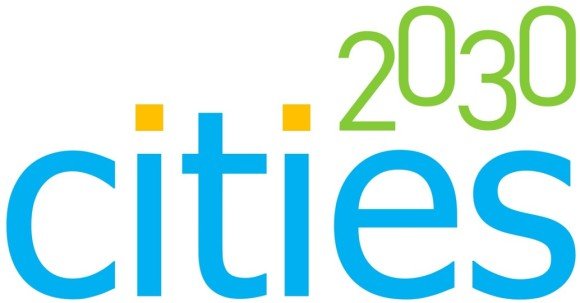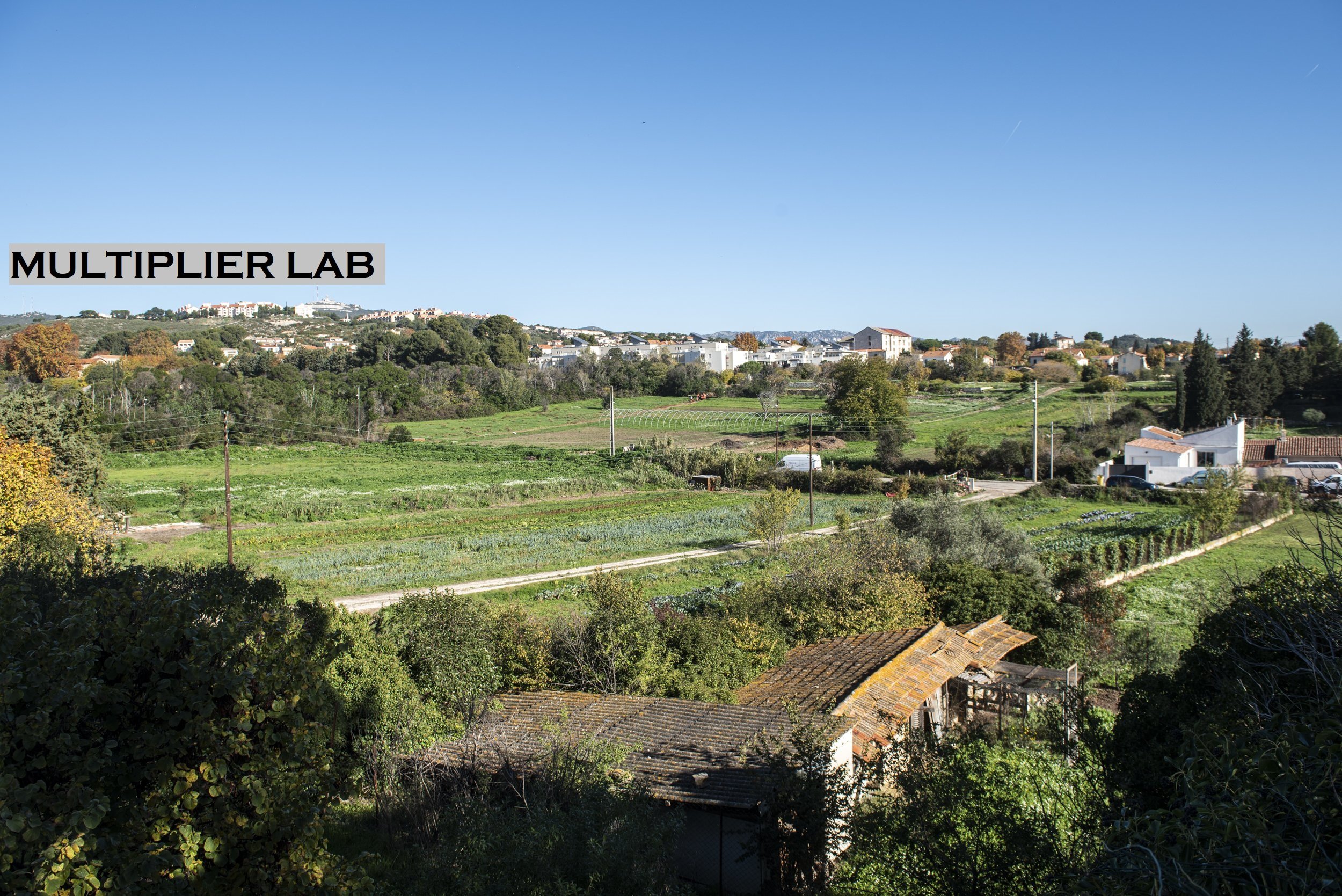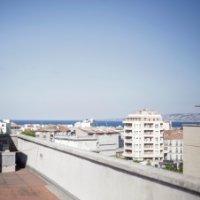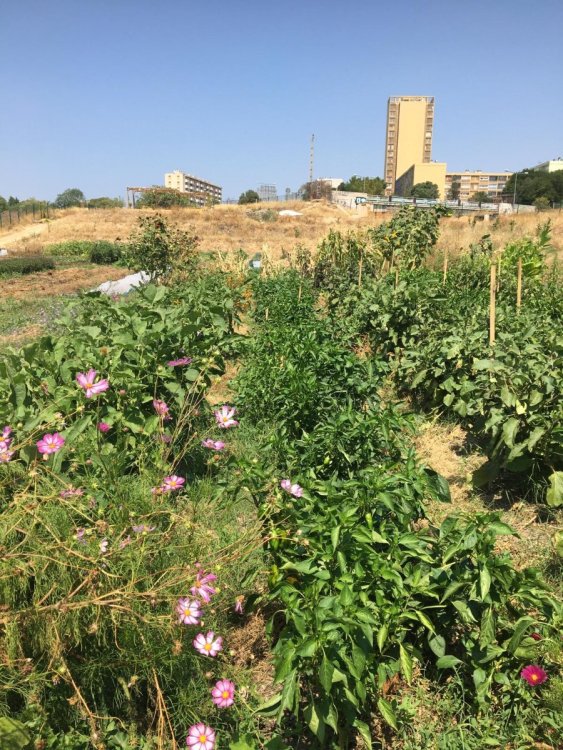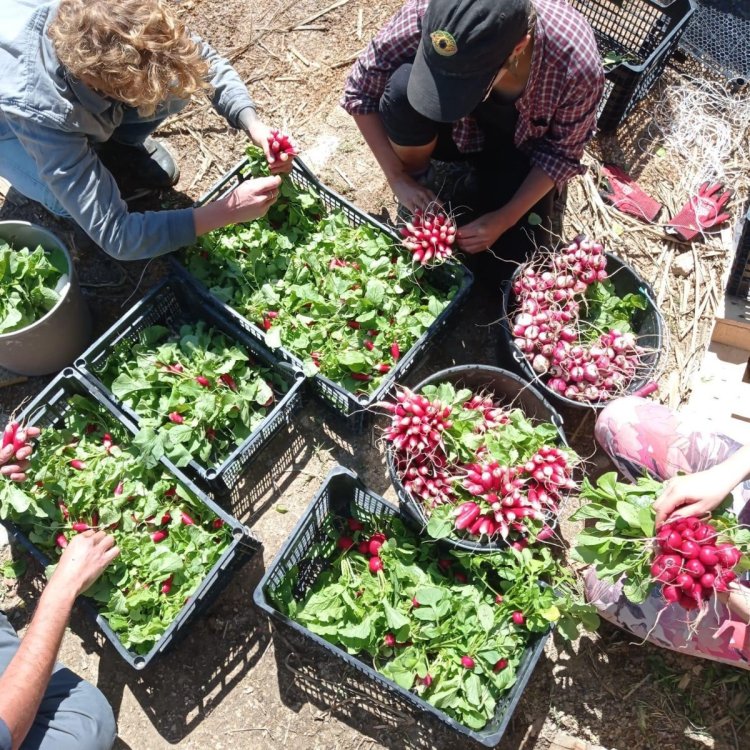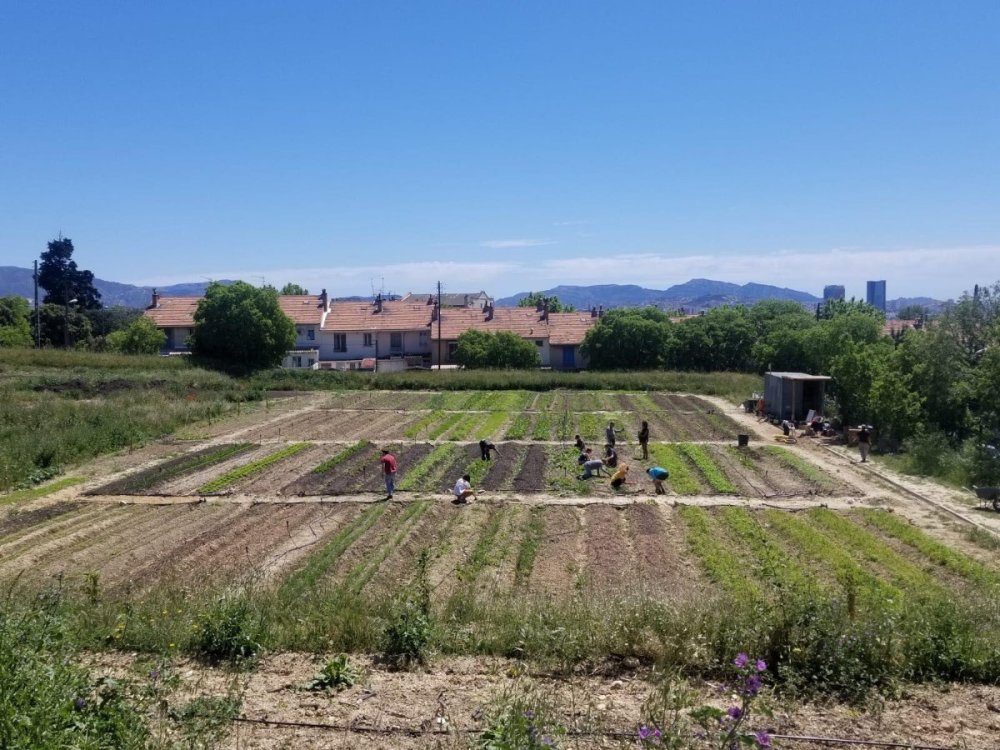Policy: Policy Action Plan
Vision statement
Marseille's policy lab aims to address the overarching goal of fostering long-lasting, inclusive urban and periurban agriculture as a vital part of a just ecological transition for (CRFS). This is achieved through three interconnected components: ensuring land access and security, fostering inclusivity and community engagement, and involving local governance. Influencing the policy framework is essential to achieving all three of these goals, as it weaves them together into a cohesive strategy for a sustainable and equitable food system. Central to this effort is stakeholder participation: the lab's objective is to create a vibrant dynamic around these themes, actively engaging policymakers, civil society, and residents to cultivate a range of enduring socially inclusive, agroecological projects.
The City Lab's objectives thus are as follows:
-
Land Access and Security: Facilitating access to land for agroecological projects within urban areas and influencing local policies to enhance security for these initiatives.
-
Inclusivity in Urban Agriculture - CAJAU Action-Research Project: Conducting collaborative action research with stakeholders—including residents, project leaders, researchers, and policymakers—to identify and address barriers to inclusivity, accessibility, and engagement for diverse socio-economic and cultural groups of UA projects especially those located in/near underserved areas.
-
Local Governance Engagement - Capri Urban Farm Handover: Collaborating with the City of Marseille to develop and implement a novel methodology that identifies, engages, and supports local stakeholders, ensuring a smooth transition of the farm from an innovative experiment to a long-term community resource.
To do this, the policy lab works simultaneously on various axes, with the following action plan.
Land Access and Security
-
Identification of Available Land: Conduct macro-level analyses and leverage citizen expertise to identify land within the city that can be mobilized or holds potential for agroecological projects.
-
Land Valuation: Facilitate the sharing of information and establish support programs to enhance the value of identified land for urban agriculture initiatives.
-
Land Preservation: Engage in research and strategic reflection to explore and implement legal tools aimed at preserving land for agroecological use, both in the present and for the future.
-
Multi-Stakeholder Engagement: Actively participate in multi-stakeholder dynamics to build influence and advocate with policymakers, ensuring urban agriculture remains a priority.
-
Policy Co-Creation: Foster horizontal dialogues through regular meetings between technical agents and stakeholders to co-create policies that secure and enhance land access for agroecological projects.
Engaging local governance - Capri urban farm transition
-
Maintain Essential Activities: Ensure continuity of core activities (workshops, events, soil maintenance) to prevent site deterioration and sustain community engagement.
-
Shared Assessment with Policymakers: Conduct evaluation workshops with key stakeholders, including the City of Marseille, to assess and adapt activities for long-term environmental, social, and economic viability.
-
Stakeholder Mobilization Methodology: Develop a flexible approach to engage stakeholders through gradual land access and collaborative workshops, fostering a collective governance model.
-
Facilitate Collective Dynamics: Organize workshops to build a shared vision and complementary activities among stakeholders, involving local policymakers in governance discussions.
-
Support Future Leaders: Provide operational, financial, and partnership support to new leaders, ensuring a smooth transition and long-term sustainability.
-
Proactive Communication and Mediation: Maintain strong communication with local residents and partners through mediation to ensure ongoing community engagement during the transition.
-
Document and Disseminate Policy Insights: Capture lessons learned throughout the transition and share findings with the City of Marseille and policymakers to inform future governance models and policy initiatives.
Urban agriculture inclusivity - CAJAU action-research project
-
Research-Diagnosis-Study: Conducting research to identify barriers and opportunities in urban agriculture accessibility within underserved neighborhoods. The project emphasizes socio-cultural and practical aspects, particularly hospitality, exploring how urban agriculture spaces can foster individual and community engagement in alignment with pre-existing foodscapes and socio-cultural practices.
-
Cooperation: Fostering partnerships among stakeholders, including local communities, organizations, and policymakers, to enhance collaboration and co-create solutions that address the needs and priorities of local residents.
-
Experimentation: Implementing innovative practices and pilot projects that test new approaches to urban agriculture and community engagement, informed by insights gained from the research-diagnosis axis, with a focus on enhancing hospitality.
-
Evaluation: Continuously assessing the outcomes and impacts of the project to ensure effectiveness and to inform future actions, focusing on how well these initiatives promote hospitality and inclusivity.
-
Policy Dissemination: Sharing findings and insights with urban agriculture project holders and recommendations to policymakers to influence decision-making and advocate for supportive policies that facilitate the accessibility and hospitality of urban agriculture.
Context assessment
CRFS issues
With respect to the policy lab, Marseille’s City Region Food System (CRFS) encounters several challenges that hinder its ability to facilitate a just and ecological transition.
-
The establishment of urban farms is obstructed by land scarcity, pressure, and speculation, making it difficult for agroecological projects to thrive.
-
Food inequalities in Marseille, exacerbated by COVID 19, stem from a combination of geographical, economic, and practical/socio-cultural barriers that limit access to fresh and locally produced food and to urban agriculture.
-
This situation is further exacerbated by barriers to the economic, environmental, social, and organizational viability of urban agriculture, hindering the development of sustainable food systems that can effectively address the needs of the local population.
In response to the challenges faced by Marseille’s City Region Food System (CRFS), public authorities have a range of policy levers at their disposal to foster long-term, inclusive urban and peri-urban agriculture. These include:
-
Enhancing knowledge of the territory regarding available and potentially available land, as well as food inequalities and accessibility issues, through shared, collaborative, mix-method and evolving tools.
-
Ensuring the protection of land as a common good, safeguarding it from speculation and scarcity to support sustainable agricultural practices.
-
Facilitating access to land for cultivation, whether through public management or by making it available to private actors, thereby encouraging agroecological initiatives.
-
Improving inclusivity and hospitality within urban agriculture spaces to create welcoming environments that engage local communities and encourage active participation.
Despite these potential levers, their implementation remains insufficient due to the compartmentalized functioning of local authorities, the multiplicity of actors and tools involved, and a lack of coordination and animation between them. Furthermore, there is a notable gap in processes that effectively integrate high-level expertise with grassroots knowledge, which is essential for addressing issues of accessibility and long-term viability. To achieve a just ecological CRFS, it is imperative to engage communities actively in governance processes, ensuring that their needs and perspectives are reflected in policy decisions.
Existing policies
Voluntary but still scattered public policies, which still lack overall management and therefore cohesion. Main actors are the city of Marseille, Aix-Marseille-
Provence metropolis, the department Bouches-du-Rhone and the PACA region. Amongst the existing measures or those under construction, it is possible to cite :
- PAAM - Projet Agri-Alimentaire Marseillais
- Projet alimentaire territorial (PAT = territorial food project) of the Aix-Marseille-Provence metropolis and the Pays d’Arles agglomeration (PETR)
- Metropolitan plan for the development of urban agriculture
- Regional plan for planning, sustainable development and territorial equality (SRADDET PACA)
- The Marseille Provence Territorial Coherence Scheme (STCoT)
- Marseille Provence Local development plan (PLUi)
Policy gaps
Despite the presence of numerous actors and the establishment of various policies in recent years aimed at enhancing urban food production and land preservation, significant gaps persist within the political landscape of Marseille’s City Region Food System (CRFS). The Marseille policy lab seeks to address these gaps, particularly:
-
Insufficient knowledge and visibility regarding the existing food system and its stakeholders.
-
Complex networking among actors, complicating collaboration and coordination.
-
Challenges in effectively guiding policies related to food accessibility and inclusivity in urban and periurban agriculture.
-
Lack of visibility regarding arable land that could be preserved for agricultural use.
-
Difficulties in accessing land for project developers due to high prices, scarcity, and complicated processes.
-
Land planning strategies developed without a comprehensive understanding of the territory and its actors.
-
Insufficient mechanisms for ensuring the long-term viability and governance of urban agriculture projects, including community engagement.
-
Local authorities express support for urban agriculture, yet this support often fails to translate into adequate operational or financial assistance.

CITAG and Marseille policy lab in the political landscape
The policy lab occupies a pivotal position between civil society and political authorities. Specifically, CITAG implements field projects, analyzing and sharing experiences with other stakeholders, research institutions, non-profits, and communities.
To tackle the identified structural policy gaps, CITAG has organized strategic political meetings with the City, Metropolis, Department, and Region. Additionally, CITAG collaborates closely with the City of Marseille to co-create and renew the Capri farm experiment project, fostering its development as an autonomous initiative with the active participation of local stakeholders.
Marseille policy lab
Resources, strengths and weaknesses
-
Resources: mobilization of a dense and well-identified network of associations and citizens, operational relays within local authorities,
-
Strengths: knowledge of the field (expertise through the implementation of field projects and through the analytical hindsight achieved, mastery of tools, network of field actors, position of advice, training and animation of the network of institutional actors), mastery of urban planning tools and cartographic tools, adaptable methodologies, use of sensory methods
-
Weaknesses: scalability, complexity of the tool and its handling, complexity of long term community engagement, accessibility to different audiences
Stakeholders
- ADDAP 13
- Centre social St-Joseph Servières
- Bureau des Guides
- AGAM
- Ville de Marseille
- Métropole AMP
- Terre de Liens
- Germ’
- Cap au Nord Entreprendre
- Collectif Sols Vivants
- Neo Eco
- SAFER
- Le Talus
- Graines de Soleil
- Terre d'Entraide et de Partage
- CIRAD
- Action contre la Faim
- Inhabitants
SMART goals
The overall goal of the Marseille policy lab is to foster urban and CRFS transformation by enabling more agri-ecological projects to be implementend in the city, and be sustainable in time. In order to do so, the policy lab aims to produce an information system capable of observing and analysing the evolution of local experiences in the field of agri-food justice. This information system should be participative, combining macro and sensible approaches, as well as easily and regularly updated.
The information generated will be disseminated to the general public via the Cité de agriculture’s website. This will include a map and a thematic dossier
summarising the content of the meetings, combining sociological and photographic approaches. The policy lab is also, in parallel, working on other means of foster agri-ecological projects and innovative ways of working with local authorities and citizens in order to identify available land in an easier and faster way.
In addition, concerning the urban land dimension, the policy labs’ goals are:
- Generating knowledge of the state of play via the development of a mapping tool as a support for the identification of unsealed land in Marseille.
- Working towards the installation of 2 new agri-ecological projects by the end of the Cities project, on land newly identified
- Progressive fine-tuning of the tool via its application to a given territory: identification and visit of 3 to 5 sites in the 15th district that could possibly be used for urban farming activities, if not preserved for its ecological services
- Developing advocacy for an ambitious agricultural urban planning: prefiguration of a working group for land preservation in Marseille. Reflection group on the creation/mobilisation of new urban planning tools to serve urban agriculture, or the application of tools hitherto reserved for the peri- urban or rural environment (e.g.: ZAP).
- Through the example of the autonomization of Capri, document the policy gaps and obstacles agri-ecological projects meet in our local context, and the strengths of such projects when thought in a Living Lab quadruple helix wap
SMART goals for the CAJAU project focused on inclusivity and hospitality:
-
Research-Diagnosis-Study: Conduct qualitative research with at least 30 participants from underserved neighborhoods near three urban agriculture projects to identify barriers and food practices or perceptions of local residents. Utilize qualitative and sensory methods, including photo and mental mapping, to gain insights into the socio-cultural aspects of urban agriculture accessibility.
-
Cooperation: Together with project stakeholders, co-create at least one solution per urban agriculture site and one collaborative solution across the three projects that address the identified needs and priorities of local residents.
-
Experimentation: Launch at least four pilot actions that implement innovative practices enhancing hospitality in urban agriculture settings, informed by insights gained from the qualitative research. Each project will involve community members in its design and execution.
-
Evaluation: Continuously assess the outcomes and impacts of the project to ensure effectiveness and inform future actions, focusing on how well these initiatives promote hospitality and inclusivity.
-
Policy Dissemination: Present research findings and recommendations to public policymakers, notably the City of Marseille and Marseille Metropolis, while also widely diffusing the results to other relevant stakeholders through participation in conferences and the organization of participative events.
Regarding the local governance engagement - Capri project transition
-
Maintain Core Activities: Ensure the continuation of essential activities—such as public engagement, workshops, harvesting, and soil maintenance—throughout the transition phase to prevent site deterioration and support community involvement. Aim for an average of 40 diverse visitors each month, including underrepresented groups.
-
Shared Project Assessment: Conduct ongoing evaluations through collaborative workshops with stakeholders (local partners, residents, public actors) to develop a comprehensive assessment of the Capri project. Identify key activities for continuation or modification, ensuring long-term environmental, economic, and social viability.
-
Stakeholder Mobilization Methodology: Create and implement a flexible methodology for identifying and engaging stakeholders interested in developing projects on the site, allowing for progressive testing of collective organization before formalization.
-
Facilitate Collective Dynamics: Organize workshops to foster a shared vision among project leaders, supporting the development of operational modalities and collective governance structures, with initial outcomes documented by summer.
-
Effective Handover Support: Provide continuous operational, financial, and partnership support to future project leaders, ensuring a seamless transition of leadership as the site is made available for new initiatives.
-
Proactive Local Communication: Maintain strong communication and mediation efforts with local stakeholders throughout the transition, ensuring sustained interest and participation from residents and partners.
-
Document the Transition Process: Thoroughly document the iterative transition phase, and identify the policy gaps and obstacles agri-ecological projects meet in our local context, and the strengths of such projects when thought in a Living Lab quadruple helix wap
Action plan
Urban agricultural land and wastelands
| Timeframe | Description of the action | SMART goal addressed | CRFS actors |
|
November - December 2022 |
Macro cartographic processing (city or
Cartographic queries: search for non- |
Generating knowledge of the state of play via the development of a mapping tool as a support for the identification of unsealed land in Marseille |
Ville de Marseille Métropole Aix-Marseille Provence AGAM Crige PACA |
|
December 2022 - April 2023 |
Identification of key sites (structuring spaces) in the 15th arrondissement. Technical and sensitive analysis, mobilisation of citizens for a shared diagnosis. |
Progressive fine-tuning of the tool via its application to a given territory : identification and visit of 3 to 5 sites in the 15th district that could possibly be used for urban farming activities, if not preserved for its ecological services |
ADDAP 13 Centre social St-Joseph Servières Association Dunes Association des Femmes de Bassens Bureau des Guides Germ’ Cap au Nord Entreprendre |
| February 2023 |
First cartographic visualisations combining macro (City/Metropolis) and micro (field analyses) approaches. |
1 - Generating knowledge of the state of |
None |
| Mars 2023 |
Publication of a thematic dossier reporting on the exploratory interviews dealing with land justice and food justice. |
Generating knowledge of the state of play via the development of a mapping tool as a support for the identification of unsealed land in Marseille |
ADDAP 13 Centre social St-Joseph Servières Association Dunes Association des Femmes de Bassens Bureau des Guides Germ’ Actors of food justice to be identified in the 15th district of Marseille Webmaster |
| June 2023 | Mapping of key sites in the 15th district |
Progressive fine-tuning of the tool via its application to a given territory : identification and visit of 3 to 5 sites in the 15th district that could possibly be used for urban farming activities, if not preserved for its ecological services |
Webmaster |
|
September - december 2023 |
Transmission of first resultats to local authorities for refinement and possible replication of the method to other territories. Solicitation of identified public and private landowners to envisage an operational translation (provision of land), via the establishment of links with pre-identified project initiators. |
Generating knowledge of the state of
Progressive fine-tuning of the tool via |
Ville de Marseille Potential stakeholders
|
|
September 2023 - June 2024 |
Monitoring, research and foresight on existing tools and those to be created for the preservation and provision of identified land. The many tools created and used in rural and peri-urban areas (ZAP = protected agricultural area, PAEN = Perimeter for the Protection of Natural and Agricultural Peripheral Areas, rural leases, environmental obligations, etc.) could be rethought for application in urban areas. Valuation of the actions taken by the policy lab, in order to :
|
1- Generating knowledge of the state of play via the development of a mapping tool as a support for the identification of unsealed land in Marseille 2 - Progressive fine-tuning of the tool via its application to a given territory : identification and visit of 3 to 5 sites in the 15th district that could possibly be used for urban farming activities, if not preserved for its ecological services 3 - Developing advocacy for an ambitious agricultural urban planning : prefiguration of a working group for land preservation in Marseille. Reflection group on the creation/mobilisation of new urban planning tools to serve urban agriculture, or the application of tools hitherto reserved for the peri-urban or rural environment (e.g.: ZAP). |
Ville de Marseille
Conseil départemental Bouches-du-
SAFER |
| December 2024 |
An analytical cartography on agri-food
A dashboard allowing an original |
Webmaster and/or data visualisation expert |
Local governance - Capri transition
| Timeframe | Description of the action | SMART goal addressed | CRFS actors |
|
September 2023-January 2026 |
Organize monthly open-days, festivals and workshops focused on various themes, such as sustainable gardening, cooking with seasonal produce, and community building activities. Schedule regular community harvesting days where residents can participate in gathering produce, thereby fostering community engagement. Plan for maintenance and soil care through community garden keep up with volunteers but also through working with partner urban agriculture projects Developing community/neighborhood outreach activities with materials to promote events, targeting underrepresented groups |
|
Local communities and inhabitants, City of Marseille, Local non profits, social centers, volunteers, potential project leaders |
|
December 2023 -January 2024 |
2 workshops with stakeholders to create a shared assessment of Capri’s successes and failures to identify activities to be pursued, developed modified or abandoned |
|
Local communities and inhabitants, City of Marseille, Local non profits, social centers, volunteers, potential project leaders |
|
January 2024 - september 2024 |
Construction of transition methodology Co-creation of a call for projects with the City of Marseille Diffusion of call for projects Interviews Readjustment of methodology Diffusion of call for interest manifestation Workshops on the future of Capri with identified prospective project holders |
|
Local communities and inhabitants, City of Marseille, Local non profits, social centers, volunteers, potential project leaders |
|
September 2024-March 2025 |
Test of activity for future project leaders, monitor test period Accompany collective governance, and provide support for project development |
|
Local communities and inhabitants, City of Marseille, Local non profits, social centers, volunteers, potential project leaders |
|
|
Inclusivity and hospitality of Urban Agriculture - CAJAU
| Timeframe | Description of the action | SMART goal addressed | CRFS actors |
|
January 2023-June 2024 |
Research-Diagnosis-Study: methodological design, participant recruitment, deployment of analysis, writing of report, dissemination of study results |
Research institutions, urban agriculture project leaders, non profits, public actors, inhabitants, participants | |
|
June 2024-september 2024 |
Cocreation of experimental solutions to deploy with all stakeholders, through 5 dedicated workshops |
research institutions, urban agriculture project leaders, non profits, public actors, inhabitants, participants | |
|
october 2024-january 2026 |
Deploying and monitoring of actions Continuous project results dissemination |
research institutions, urban agriculture project leaders, non profits, public actors, inhabitants, participants |
|
|
|
Evaluation plan
KPIs
Wastelands and agriculture urban land
- Number of structures identified
- Number of sites identified
- Number of meetings with structures
- Number of site visits
- Number of produced maps
- Production of data on the CRFS
Local governance engagement - Capri transition
- Number of project leaders and local stakeholders identified and trained for future leadership
- Number of workshops or training sessions held for future project holders
- Number of public actors reached through dissemination of governance innovation documentation
- Stakeholder feedback on the transition process—how smooth or challenging it has been, and areas for improvement.
- Evaluations from local project leaders on the effectiveness of CITAG’s support during the handover.
- Qualitative assessment of stakeholder engagement—how well the project leaders collaborate and develop shared governance.
- Perception of transition phase by inhabitants and local partners
- Integration of identified supporting policies integrated into local policy frameworks
Monitoring methods :
- Meeting minutes and reports of site visits
- Project dashboard
Communication and dissemination :
- Production of maps, stats and thematic dossiers available via CITAG’s internet page
- 48h de l’agriculture urbaine (yearly festival on urban agriculture)
- Journées européennes des agricultures urbaines (European Urban Agriculture Days)
- Regional Urban Agriculture Meeting
- Exposition Terres Communes
